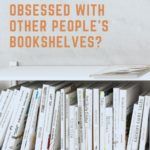A day or so later I learned about Zoom backgrounds, and I now attend meetings from inside various Impressionist paintings. If we know each other and there’s a bookshelf in your house or office, chances are I’ve planted myself in front of it the minute you left the room. I looked for books we have in common, books I’d wanted to read but had forgotten about. If I noticed that you had a lot of books about a particular location, I would have assumed you had perhaps dreamed of living in that place. We have never had such a window into so many people’s lives (and bookshelves!) as we have since COVID-19. Meetings went online. Interviews switched from TV studios to inside people’s homes. Why are we so obsessed with other people’s bookshelves? What can someone’s bookshelf really tell you about who they are? Are we automatically assuming that some of these people have the same relationship to books as avowed bibliophiles?
Building Collections for Fictional People
When I posed the question of why we are interested in the books other people own and have kept to my friends, one thing that came up was social comparison theory. My journey through the liberal arts did not take me through social psychology (I was very much a literature and foreign languages gal), so I am not an expert but a quick definition of this phenomenon is that it is one way that we evaluate our opinions against those of others. I thought about people who might have insight on this topic and landed on The Strand Bookstore’s Books By The Foot team. They provide books in large-scale orders for movies, theater, and TV productions. I was able to speak to Miguel Soto, Director of Personal Collections, about the types of requests he and his team fulfill and how they go about doing it. Sometimes they are given specific titles to seek out and sometimes they are given a rough sketch of a character and are asked to build a library to suit that person. It is important to be able to put oneself in that character’s mindset. Why do we care about the books in the background? “Books are more than mere objects,” Miguel suggests. “When you look at someone’s collection it shows what a person is interested in and it gives you a bit of a thrill because you see what you have in common. People often have books and it’s interesting to see what people collect accidentally or intentionally.”
My Bookshelf, Myself
I do not think that Shaun Robinson, who hosts the tell-all episodes of TLC’s 90 Day Fiancé (which is another pleasure I refuse to feel guilty about) and I have very much in common. Still, I squinted at the bookshelves in the background on the latest tell-all to see what books were there. She’s very good at managing the rather unique personalities who end up on that show so I was expecting some psychology titles. (I couldn’t see anything and I am still not sure if they were her actual books or props—Shaun, if you’re see this, feel free to let me know.) My own bookshelves might say that I have very little self-control. I feel like it would be otherwise difficult to draw a conclusion about me, but who wouldn’t say that? There are books that I have hung on to but have not read since 2004. Is Divine Secrets of the Ya-Ya Sisterhood still part of who I am today? I barely remember it—I think I remember watching the movie more times than I’ve read the book. It sits between The Six Wives of Henry VIII and a 2017 Book of the Month selection that was just okay. I even have the Ya-Ya companion books. If you looked at my bookshelves right now, you wouldn’t be able to tell which books I read out of obligation in the years when I still did that. Then again, you can see that I’ve never passed up an interesting edition of Joan Didion or Virginia Woolf. That I love Tamora Pierce and Meg Cabot and have for almost 20 years. You can see what’s been read multiple times and what looks basically new. This won’t give you a complete picture of who I am but I suppose it is as good a start as any. What can you tell about a person from their bookshelves? Perhaps everything. Perhaps nothing at all.












